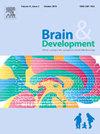杜氏肌营养不良患者胃肠道并发症的发生率和处理:一项回顾性队列研究
IF 1.3
4区 医学
Q4 CLINICAL NEUROLOGY
引用次数: 0
摘要
背景杜氏肌营养不良症(DMD)的胃肠道并发症研究不足,特别是在亚洲人群中。本研究旨在确定胃肠道并发症的频率和临床特征。方法本单中心回顾性研究回顾了2010年9月1日至2023年1月1日期间459例遗传或活检证实的亚洲DMD患者的医疗记录,年龄1 - 48岁。结果便秘是最常见的并发症,共149例(32.5%),其次是吞咽困难43例(9.4%)。其他疾病包括肠易激综合征8例,胃食管反流病7例,痔疮6例,急性胃扩张4例,乙状结肠扭转2例,肠囊性肺肿2例。阑尾炎、食管憩室、麻痹性肠梗阻、食气症、肛门闭锁、吸收不良综合征、大便失禁、炎症性肠病、消化道出血、直肠脱垂各1例。对便秘的治疗包括不干预20例(13.4%),水合皮硫酸钠62例(41.6%),氧化镁59例(39.6%),聚乙二醇4000 20例(13.4%)。Logistic回归分析显示,体重指数(BMI)、年龄和血管紧张素转换酶抑制剂的使用与便秘显著相关。本研究强调便秘是DMD最常见的胃肠道并发症,并确定了几种罕见但严重的并发症,为现实世界的临床实践提供了关键见解。本文章由计算机程序翻译,如有差异,请以英文原文为准。
Prevalence and management of gastrointestinal complications in Duchenne muscular dystrophy: A retrospective cohort study
Background
Gastrointestinal complications in Duchenne muscular dystrophy (DMD) have been understudied, particularly in Asian populations. This study aimed to determine the frequency and clinical characteristics of gastrointestinal complications.
Methods
This single-center, retrospective study reviewed medical records of 459 Asian patients with genetically or biopsy-confirmed DMD, aged 1–48 years, from September 1, 2010, to January 1, 2023.
Results
Constipation was the most common complication, affecting 149 patients (32.5 %), followed by dysphagia in 43 patients (9.4 %). Other conditions included irritable bowel syndrome in 8, gastroesophageal reflux disease in 7, hemorrhoids in 6, acute dilatation of stomach in 4, sigmoid colon volvulus in 2, and pneumatosis cystoides intestinalis in 2. Additionally, 1 case each of appendicitis, esophageal diverticulum, paralytic ileus, aerophagia, anal atresia, malabsorption syndrome, fecal incontinence, inflammatory bowel disease, gastrointestinal bleeding, and rectal prolapse was observed. Treatments for constipation included no intervention in 20 patients (13.4 %), sodium picosulfate hydrate in 62 (41.6 %), magnesium oxide in 59 (39.6 %), and polyethylene glycol 4000 in 20 (13.4 %). Logistic regression analysis showed that body mass index (BMI), age and angiotensin converting enzyme inhibitor use was significantly associated with constipation.
Conclusions
This study highlighted constipation as the most frequent gastrointestinal complication in DMD and identified several rare but serious complications, offering key insights into real-world clinical practice.
求助全文
通过发布文献求助,成功后即可免费获取论文全文。
去求助
来源期刊

Brain & Development
医学-临床神经学
CiteScore
3.60
自引率
0.00%
发文量
153
审稿时长
50 days
期刊介绍:
Brain and Development (ISSN 0387-7604) is the Official Journal of the Japanese Society of Child Neurology, and is aimed to promote clinical child neurology and developmental neuroscience.
The journal is devoted to publishing Review Articles, Full Length Original Papers, Case Reports and Letters to the Editor in the field of Child Neurology and related sciences. Proceedings of meetings, and professional announcements will be published at the Editor''s discretion. Letters concerning articles published in Brain and Development and other relevant issues are also welcome.
 求助内容:
求助内容: 应助结果提醒方式:
应助结果提醒方式:


